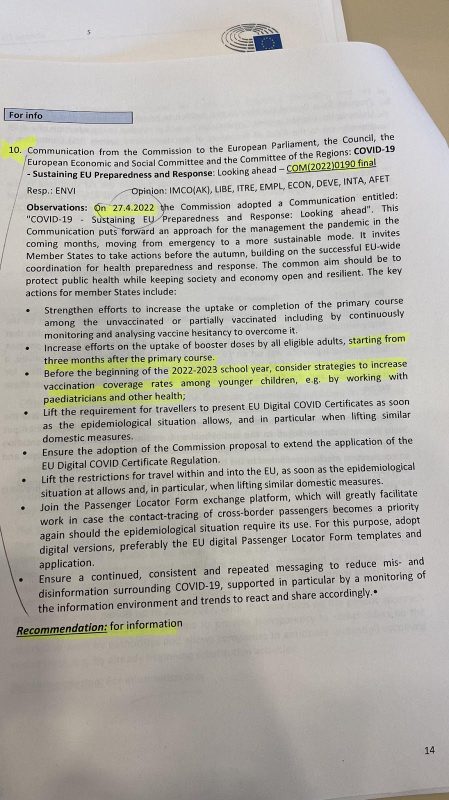
Anyone who imagines that the suspension of Covid-related measures in much of Europe means that those measures, and hence the C-19 vaccination campaign, are things of the past should have a look at the recent pronouncements on the subject of the European Commission, starting with Commission President Ursula von der Leyen’s April 27 statement on the “next pandemic phase.”
While acknowledging that the “emergency” phase of the pandemic is over – but apparently not, on her account, the pandemic as such – von der Leyen warns that “we must remain vigilant. Infection numbers are still high in the EU and many people are still dying from COVID-19 worldwide. Moreover, new variants can emerge and spread fast.” “But we know the way forward,” she concluded, “We need to further step-up vaccination and boosting, and targeted testing”. The emphasis is mine.
Note that von der Leyen does not merely say that vaccination and boosting should continue – say perhaps for particularly vulnerable groups – she says rather that they have to be “further stepped-up”! This in an EU in which, according to the European Centre for Disease Prevention and Control, nearly 85% of the adult population has already been fully vaccinated!
In the Commission press release, von der Leyen’s call for “stepped-up” vaccination and boosting is the first of a series of measures that member states are called on to take “before autumn.”
A factsheet on “COVID-19 – Sustaining EU Preparedness and Response: Looking ahead,” which was published by the European Commission on the same day, April 27, reiterates von der Leyen’s point. The first section is entitled “Increasing uptake of COVID-19 vaccination” and the first bullet point reads:
• Member States should increase vaccination uptake and the administration of boosters and fourth doses for those who are eligible. They should also increase vaccination among children.
Here, the emphasis is in the original. The second bullet point continues:
• Member States should prepare COVID-19 vaccination strategies for the coming months taking into account the simultaneous circulation of seasonal influenza and incorporate COVID-19 vaccination into national vaccination programmes.
On May 12, The European Parliament’s recently created special committee on the Covid-19 pandemic (COVI) hosted a question-and-answer session with EU Health Commissioner Stella Kyriakides. (Full video here.) In a tweet, the French Member of the European Parliament Virginie Joron summed up the gist of Kyriakides’s remarks as follows (author’s translation):
PRIORITY: 100 million unvaccinated in EU who will have to be convinced and targeted without discriminating against them.
> combatting misinformation
> next pandemic with new variants this winter
Like Kyriakides, incidentally, the Commission press release also identifies “intensify[ing] collaboration against mis- and disinformation on COVID-19 vaccines” as one of the priority actions for the fall.
Finally, in a more recent May 17 tweet, Virginie Joron shared the below photo of a Commission document that was distributed to the EU Parliament’s Internal Market and Consumer Protection Committee and that includes, in effect, a “vaccination strategy” for the fall. This document likewise “targets” the unvaccinated, its first bullet calling on EU member states to: “Strengthen efforts to increase the uptake or completion of the primary course among the unvaccinated or partially vaccinated including by continuously monitoring and analysing vaccine hesitancy to overcome it.”

The emphasis on “targeting” the unvaccinated is particularly puzzling given how rapidly vaccine-induced protection against Covid-19 is now known to wane. In immunological terms, once it has, there is, of course, no meaningful distinction to be made anymore between vaccinated and unvaccinated. Some studies and data even suggest that the vaccinated are at this point more prone to infection. Only the very recently vaccinated may perhaps enjoy some added protection.
Numerous observational studies have demonstrated how rapidly the efficacy of the Covid-19 vaccines wanes: in particular, that of the BioNTech-Pfizer vaccine, which is by far the most widely-used vaccine in the EU. But there is no need to cite these studies here, since the very next bullet point in the Commission document tacitly acknowledges the rapid waning of vaccine efficacy, calling on member states to: “Increase efforts on the uptake of booster doses by all eligible adults, starting from three months after the primary course.” The emphasis here is again mine.
The third and last vaccine-related bullet-point specifically concerns child vaccination. It is truncated in the document photographed by Joron, but the full version is to be found in the Commission’s most complete statement of its Covid-19 strategy for the fall: a communication to the Parliament and other EU institutions that likewise dates from April 27. The full version of the recommendation reads as follows: “Before the beginning of the 2022-2023 school year, consider strategies to increase vaccination coverage rates among younger children, e.g. by working with paediatricians and other health professionals who are trusted sources of information for many parents.”
It was considerate of Kyriakides to insist that the unvaccinated should not be discriminated against, even if they need to be “targeted.” But it should be noted that the April 27 communication, as reflected in Joron’s photo, also stresses the need to “[e]nsure the adoption of the Commission proposal to extend the application of the EU Digital COVID Certificate Regulation.” The main effect and purpose of the EU Digital Covid Certificate, which has also served as framework and infrastructure for domestic “health” or “vaccine” certificates in EU member states, is, of course, precisely to reward the vaccinated and discriminate against the unvaccinated.
The European Commission’s April 27th documents thus clearly invoke a new rollout of the Covid-19 vaccination campaign in the fall, specifically targeting the hitherto unvaccinated and also children. Moreover, if the Commission gets its way – as it can be expected to – and the EU Digital Covid Certificate is indeed extended, they also raise the specter of this new rollout being combined with exactly the same coercive, discriminatory measures that turned Europe’s unvaccinated into social pariahs for much of the last year.



